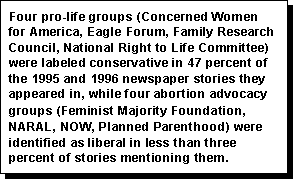 |
|||||||||
|
 |
||
|
 |
||||||||||||||||||||||||
|
||||||||||||||||||||||||
 |
||||||
|
||||||
 |
||||||
|
 |
||||||||||||||||||
|
||||||||||||||||||
 |
||||||||||||||||||||||||
|
||||||||||||||||||||||||
 |
||||||||||||||||||
|
||||||||||||||||||
|
|
|
Thursday, January 22, 1998 - Vol. Two, No. 2 - Media Inquiries: Keith Appell (703) 683-5004

Five Years of Media Studies Confirm Reporters Favor Abortion Advocates at Expense of Pro-Lifers Five Ways the Media Promote Abortion As abortion advocates celebrate the 25th anniversary of the Roe v. Wade decision legalizing abortion on demand, the Media Research Center released today a Special Report titled "Roe Warriors: The Media's Pro-Abortion Bias," which documents, using five years of MRC studies, five ways in which the media tilt the abortion debate in favor of the advocates of abortion on demand. To see the full report, click on www.mrc.org/ specialreports/ROE2.html. Call Keith Appell at the number above for interviews with the authors. Here's an executive summary of the main points:
2. The abortion issue is a divisive matter in only one political party. In the 1996 elections, network reporters harped on the struggle within the Republican Party over platform language on abortion, but not on the Democratic platform fights. In the three months before the 1996 conventions, the GOP struggle attracted 60 TV stories, while the Democrats drew only one. In prime time convention coverage, the networks brought up the Republican abortion platform fight on 55 occasions but not once did they ever bring up discord in the Democratic Party during prime time. 3. Reporters have shown little interest in the facts behind partial-birth abortion. In the rare instances of reporting on efforts to ban this procedure, almost always in conjunction with a cycle of congressional passage and presidential veto, network reporters have offered inaccurate claims and statistics in almost one-third of their stories. TV reporters told the public partial-birth abortions were "rare," that only "about 500" were performed annually, and usually on babies with severe birth defects. In an embarrassing scoop in The New York Times last year, abortion advocate Ron Fitzsimmons said he'd "lied through his teeth" to ABC about the procedure and guessed 5,000 partial-birth abortions occurred annually, mostly on healthy babies. 4. Pro-life protests and activities are not news. The annual March for Life on the anniversary of Roe has been ignored or given a few seconds on network newscasts, while liberal protests and marches (sometimes involving far fewer protesters) draw more attention. Gatherings of a few thousand opponents of California's Proposition 209 and a thousand left-wing protesters of the launching of NASA's plutonium-powered Cassini space probe both drew more network air time. 5. Pro-abortion violence is not news. While network newscasts presented more than 500 stories on violence against abortionists and clinic workers since the shooting of Dr. David Gunn in 1993, the violence of abortion is ignored, as well as the violence and harassment of abortion advocates and malpracticing abortionists. -- Tim Graham, Steve Kaminski, and Clay Waters
Home | News Division
| Bozell Columns | CyberAlerts |







 1. One
side is presented as ideological, the other is not. Abortion advocates are rarely
labeled as liberal, and are described in the "abortion rights" argot they
prefer, while pro-life groups and spokesmen are often described as conservative and never
in the "pro-life" language they prefer. A survey of 1,050 news stories in
The New York Times, The Washington Post, and USA Today in 1995 and 1996
mentioning any one of four pro-life or four abortion advocacy groups found the pro-life
groups were labeled as "conservative" in 47 percent of stories, while abortion
advocates were labeled "liberal" less than three percent of the time.
1. One
side is presented as ideological, the other is not. Abortion advocates are rarely
labeled as liberal, and are described in the "abortion rights" argot they
prefer, while pro-life groups and spokesmen are often described as conservative and never
in the "pro-life" language they prefer. A survey of 1,050 news stories in
The New York Times, The Washington Post, and USA Today in 1995 and 1996
mentioning any one of four pro-life or four abortion advocacy groups found the pro-life
groups were labeled as "conservative" in 47 percent of stories, while abortion
advocates were labeled "liberal" less than three percent of the time. 